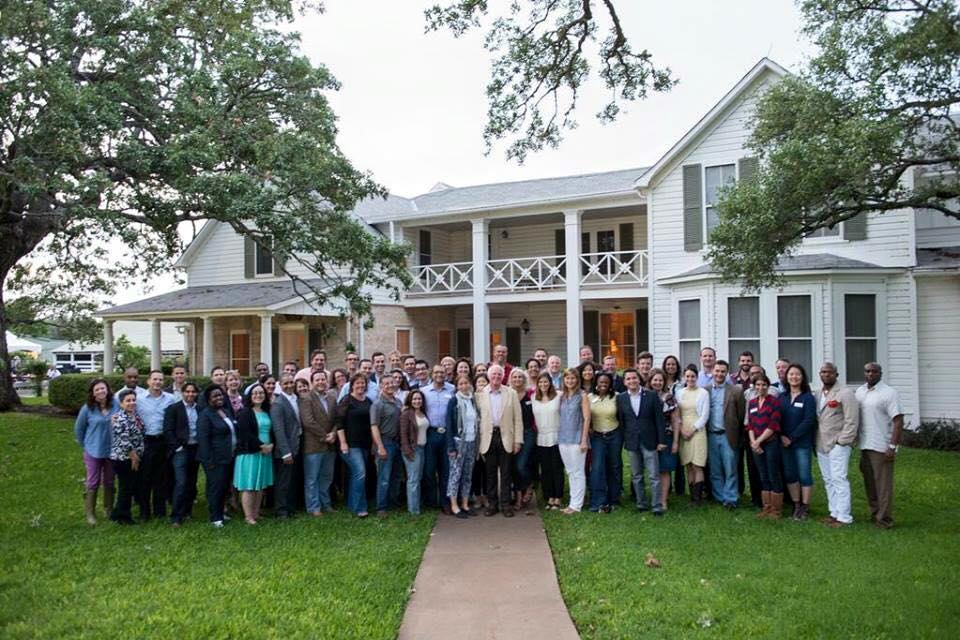Featured above: 2015 Presidential Leadership Scholars at the Lyndon Baines Johnson Library and Museum. Photo credit: Grant Miller
We finished up yet another session of the 2015 Presidential Leadership Scholars Program. I have to say that these sessions are getting richer and richer the better I get to know the faculty and other scholars. As I was going into this last session, though, I had lower expectations than the previous sessions because this was the first session where we were learning from the lessons of a deceased President. Learning real-time from President Bill Clinton and President George W. Bush these past couple months has been fascinating as my fellow scholars and I learned techniques and best practices in leadership “straight from the horse’s mouth” so to say. As it turns out, I was wrong to have lower expectations from the Lyndon Baines Johnson Foundation team. The LBJ team and PLS faculty put together a truly fascinating series of workshops and talks focused on leveraging various influence and persuasion techniques to gain buy-in from key stakeholders and together accomplish seemingly impossible tasks. Sessions included listening to taped phone conversations of President Johnson and his team as they worked to pass the Voting Rights Act and other critical legislation of the Great Society to wage the war on poverty in the U.S.
Highlights from the weekend included a discussion with members of President Johnson’s core team about everything from his relationship with Martin Luther King, Jr. to Vietnam, workshops with PLS faculty to draft a core statement and story spine for Nuru’s strategy to take our model to conflict-affected fragile states, a trip to the LBJ ranch and a sunset BBQ on the river to wrap up the evening.
Here are my top takeaways about influence and persuasion from Session 4:
- Develop a core statement. When mapping out various stakeholders that will be important to win over to your cause or initiative, it’s important to develop a core statement that sits at the heart of your message and never changes – regardless of the stakeholder you are addressing.
- Hustle over expertise. Just because you’re not an expert in a given technical field doesn’t mean that you can’t influence stakeholders around that topic. You can’t always be the smartest person in the room, but you can be the most prepared person in the room.
- Know yourself, know your enemy. Going into a negotiation, know the strengths and weaknesses of both your team and your opponent.
- How do you react when you lose? When you fail, don’t let it wear on you – shift gears immediately and move on to the next fight. It’s OK to show emotion briefly, but as a leader, you must move on quickly.
- Get your hands dirty. When there’s a crisis, leaders need to get personally involved.
- Know who your target audience is and what they want. When building a plan to get people to internalize your values and commit/buy-in to your idea, you must clearly answer four questions: 1) What is it you’re trying to achieve? 2) Who needs to be influenced to achieve this? 3) What do they value? 4) What tactics will influence them?
- Use influence tactics. We reviewed 11 key influence tactics that one can draw on to win over stakeholders to your idea or cause: rational persuasion, apprising, inspirational appeals, consultation, exchange, collaboration, personal appeals, ingratiation, legitimating, pressure and coalitions. Strong teams develop core competency in 4-6 diverse influence tactics.
- Know determinants for success when using influence tactics. Research shows that Sector and Organization are greater determinants of what influence tactics work over Gender and Geographic Region.
- Every leader deals with uncertainty. In these moments, we have to rely on the “art” of leadership and influence and not the “science.”
- It’s all the same song. Don’t think about your various messages to different stakeholders as separate messages and ideas. They all need to extend from and center on the same central theme and values.
I’ll write again next month after Session 5, hosted at the George H.W. Bush Presidential Center in College Station, TX.


